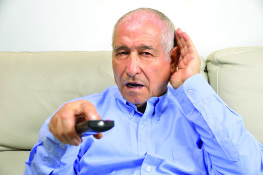Your Refrigerator Is Running – Can You Hear It?
Presented by Dana Luzon Coveney, Au.D, FAAA
 You’re probably familiar with the many telltale, well-known signs of hearing loss — asking people to repeat themselves frequently, turning up the TV to uncomfortable levels for others in the room, or leaning into a conversation on one side to use your “good ear.”
You’re probably familiar with the many telltale, well-known signs of hearing loss — asking people to repeat themselves frequently, turning up the TV to uncomfortable levels for others in the room, or leaning into a conversation on one side to use your “good ear.”
You’re probably familiar with the many telltale, well-known signs of hearing loss — asking people to repeat themselves frequently, turning up the TV to uncomfortable levels for others in the room, or leaning into a conversation on one side to use your “good ear.”
But what if speech is clear to you and you never turn up the TV — but you can’t hear whether the car you’re standing next to is running? This is an actual type of hearing loss, called reverse-slope hearing loss (RSHL), and people with this type often don’t realize they have a hearing impairment.
In this type of hearing loss, the low frequencies are affected far more than the higher ones. This gives the audiogram the opposite shape — the graph starts in the lower-left-hand corner and slopes upward steeply. Because it affects mainly the lower frequencies, it is also known as low-frequency hearing loss.
RSHL is rare: It affects only 3,000 people in the U.S. and Canada. Put differently, for every 12,000 cases of hearing loss, only one person has RSHL. Like ski-slope hearing loss, there are different degrees of RSHL.
Causes of Reverse-Slope Hearing Loss
Many people don’t suspect they have RSHL unless someone in their family already has it, which underscores one of the main sources of RSHL: genetics. Wolfram syndrome, Mondini dysplasia, and inheritance through a dominant gene have all been identified as sources of RSHL.
Certain diseases have been implicated as well, mainly those affecting the hair cells, which are responsible for sending sound information from the inner ear to the brain. Examples include sudden hearing loss, Ménière’s disease, and viral infection.
The third most common source of RSHL is anything that causes a change in the pressure of the endolymph, a fluid in the inner ear.
Symptoms of Revere-Slope Hearing Loss
Difficulty understanding speech on the phone. The aspects of speech that give it clarity (the consonants) are in the higher frequencies, the treble side of sound, but the aspects of speech that give it volume (the vowels) are in the lower frequencies, the bass side. Because RSHL involves the lower frequencies, speech loses its volume but retains its clarity. Face-to-face conversation, therefore, is not usually a problem. But the phone mainly delivers the low and middle frequencies, so it can pose a problem for RSHL.
Ease understanding women and children but not men. Again, because RSHL affects the lower frequencies, those with RSHL more clearly understand higher-frequency speech — that of women and children — than lower-frequency speech, such as that of men. Inability to hear low-frequency environmental sounds. Thunder and a refrigerator humming are examples of low-frequency environmental sounds.
Diagnosing Reverse-Sloping Hearing Loss
Key to diagnosis is a well-educated patient. Because this condition is rare, many in the hearing care field simply haven’t encountered it. RSHL has a distinct set of characteristics that an audiologist will look for but is not limited to:
Unusually good speech
Sensitivity to high-frequency environmental sounds
Pure-tone hearing losses
Inability to adjust to standard ski-slope hearing technology settings
Treating Reverse-Slope Hearing Loss
Those with RSHL tend to have high expectations of hearing aids, which can lead to frustration. An audiologist who hopes to successfully fit an aid for RSHL has to build the settings from the ground up, for several reasons.
Hearing aid settings are meant for high-frequency hearing loss. As previously mentioned, only 3,000 people in the U.S. and Canada have RSHL; many millions have high-frequency hearing loss. It makes sense that the industry would weigh toward the type of hearing loss with the highest incidence but still allow audiologists to customize individual aids for rare types of hearing loss. RSHLs require different amounts of amplification across a different range of frequencies. People with RSHL have already successfully adapted to their speech needs. Having been born with this condition, many with RSHL develop the ability to navigate speech easily.
Treating RSHL requires taking time to really listen to the patient, and then build the settings to what they find comfortable, audible, and helpful.
Why Is It Important to Treat Reverse-Slope Hearing Loss?
You may well be thinking, “Those symptoms don’t sound so bad — why bother putting myself through all the frustration of getting diagnosed and fitted?”
The key reason is safety. Much of what you lose with RSHL is environmental sound. If you can’t hear a car coming, you can’t avoid it. If someone some distance from you is trying to warn you away from something, you might not hear it, because volume is a product of the lower frequencies.
Another reason is enjoyment. There are many aspects and nuances in music that you might be missing out on if you have RSHL, because you’re missing the low-frequency sounds — for example, much of what is below middle C.
Dana Luzon Coveney, Au. D. , FAAA,
Doctor of Audiology
Originally from Southern NJ, Dana Luzon received her undergraduate degree in Speech Pathology and Audiology from the Richard Stockton College of NJ, and continued on to receive her Doctorate of Audiology at Salus University’s residential program. Her varied clinical experiences throughout her doctoral studies include: VA hospitals, rehabilitation clinics, ENT and private practice settings. Her professional interests include: audiologic rehabilitation and progressive tinnitus devices. Her interests in the field outside of the clinic include: Humanitarian Audiology, and Audiology Awareness. Dr. Luzon currently lives in West Palm Beach, FL.
Audiology and HEaring Aids of the Palm Beaches
561. 627. 3552
4266 Northlake Blvd,
Palm Beach Gardens, FL 33410
HearingCareFL.com
Check Also
RejuvaNATION MedSpa: Elevating Men’s Health to New Heights
Embark on a Journey to Revitalize Your Vitality Rediscover the joy of a spontaneous sex …
 South Florida Health and Wellness Magazine Health and Wellness Articles
South Florida Health and Wellness Magazine Health and Wellness Articles




